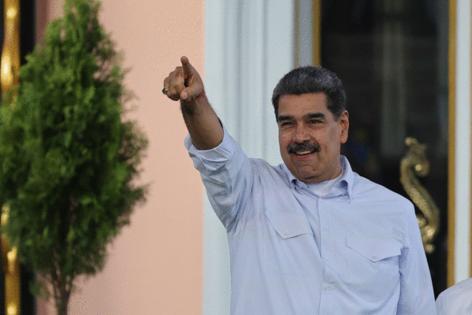Trump taunting Maduro on Venezuela coast spurs questions on goal
Published in News & Features
The White House calls its decision to send naval forces and 4,000 troops off the coast of Venezuela a drug-interdiction effort. The move has also prompted speculation that President Donald Trump may be preparing something more aggressive against the country’s leader, Nicolas Maduro.
The deployment of the Iwo Jima Amphibious Ready Group and 22nd Marine Expeditionary Unit gives the U.S. the capability to attack targets on land — a much different specialty than that possessed by the nimble Coast Guard cutters and high-speed boats that normally intercept South American cocaine.
Two of the ships are headed for the southern Caribbean, just north of Venezuela, with the third in the Pacific.
Those movements have spurred questions about Trump’s ultimate goal. The president labels Maduro a terrorist and on Aug. 7 his administration put a $50 million bounty on Maduro’s head. In his first term, Trump pressed for Maduro’s ouster, and a former top envoy said he hoped the Venezuelan leader wouldn’t be able to stay in power much longer.
Would Trump, whose main foreign policy pledge across two terms is to end U.S. involvement in “forever wars,” launch a new one in his own hemisphere?
“That is the million-dollar question,” said Rebecca Bill Chavez, who served as a top Pentagon official for the region under former President Barack Obama. Trump’s focus on ending wars “does not necessarily preclude some sort of action in Venezuela,” she said.
Chavez warned against the perils of a U.S. attack, saying that once on the ground, the military would have no easy exit. While the U.S. invaded Panama to get rid of Gen. Manuel Noriega in 1989, that kind of surgical extraction was simpler there given the country is so much smaller than Venezuela.
If anything, the size of the current U.S. deployment — just a fraction of the more than 26,000 troops used for Panama — suggests Trump isn’t preparing to invade Caracas. The American public wouldn’t support the loss of military life for a Venezuela mission, Chavez said.
Instead, the U.S. presence looks like the Caribbean edition of Trump’s more aggressive tactics at home, like sending the military to the U.S. border to stop undocumented migrants or using the National Guard to patrol streets in US cities.
“I won’t get ahead of the president with respect to any military action or questions about that ever,” White House press secretary Karoline Leavitt told reporters Thursday. “The president is prepared to use every element of American power to stop drugs from flooding into our country and to bring those responsible to justice.”
She called Maduro a “fugitive” and “not a legitimate president.”
In response to the U.S. deployment, Venezuela announced it would send vessels to a key oil-exporting hub near Colombia. Maduro earlier ordered the deployment of 15,000 troops, as well as surveillance drones, to the Colombian border to counter U.S. military activities in the region.
Elliott Abrams, Trump’s special representative for Venezuela in his first term who predicted Maduro’s downfall was inevitable, said he doesn’t expect Trump to invade. But that could change if Maduro were to use force against neighboring Guyana, a nation his regime targeted by reopening a long-settled border dispute.
Secretary of State Marco Rubio visited Guyana in March and pledged “consequences” for the Maduro regime if it were to attack Guyana or Exxon Mobil Corp. production there. Rubio is set to visit Mexico and Ecuador next week to discuss cooperation on the fight against the cartels.
If Trump’s goal were to bring down the Venezuelan regime, Trump would squeeze Maduro more financially and not allow Chevron Corp. to resume oil production, as he did in July, Abrams said.
“I tend to view this as narcotics interdiction,” Abrams said.
For Geoff Ramsey, a senior fellow at the Atlantic Council and Venezuela researcher, the deployment of warships in the Pacific —- on the other side of the Panama Canal from Venezuela, but along a major narco-trafficking route — shows Trump is focused on drugs rather than regime change. Those could include seizing drug shipments in the Caribbean or shooting down cocaine flights, he said.
Some U.S. officials may hope the signal of US strength off Venezuela’s shore motivates disenchanted army officials to overthrow Maduro, but Maduro and his mentor and predecessor, the late Hugo Chavez, have proved adept at quashing plots, Ramsey said.
Still, the mere menace of overwhelming U.S. presence could help deter Maduro from arresting opposition leader Maria Corina Machado as he has threatened, Ramsey said.
“Trump has been very clear in rejecting any kind of regime-change operations,” Ramsey said. “The U.S. is not interested in being the tip of the spear for an operation that could lead to even greater instability in Venezuela.”
(Tony Capaccio and Courtney McBride contributed to this report.)
©2025 Bloomberg L.P. Visit bloomberg.com. Distributed by Tribune Content Agency, LLC.







Comments